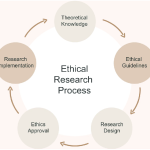
Ethical Considerations in Modern Research Practices
December 26, 2024
ISI Journal vs Scopus: A Comparative Analysis for Academics
December 26, 2024Learning how to do study well is an important skill for doing well in school in any subject. Conducting thorough and useful research is an important skill to have whether you’re writing a simple essay or a complicated thesis. Still, a lot of students find it hard to handle the huge amount of information that’s out there. They have trouble sorting through data, figuring out which sources are reliable, and putting their results in a way that makes sense. This task shows how important it is to do research in a structured way that makes it easier and improves the quality of the results.
Because this article knows how important research is for doing well in school, it tries to take the mystery out of the process by giving students five simple tips that will help them have more productive and less stressful research experiences. These strategies are meant to not only speed up your research but also improve the quality of your work. They could make the difficult job of starting to dissertation writing help easier to handle and even fun. Students can build a strong study foundation that helps them do better in school and gives them confidence in their ability to handle difficult topics by using these tips.
Tip 1: Make your research question very clear
One of the most important components of any successful research venture is a research question that has been well formulated. It directs the course of your research and assists you in concentrating your efforts on locating material that is pertinent to your inquiry. You should begin by determining the primary subject or problem that you want to investigate, and then you should limit it down to a precise question that is both clear and easy to understand. This question ought to be specific enough to steer the conversation in the right direction, while yet being broad enough to permit an in-depth investigation. The questions “What impact does daily technology use have on teenagers’ social skills?” and “How do renewable energy sources affect global economic policies?” are two examples of research questions that are productive.
Tip 2: Use sources you can trust
The sources you use have a lot to do with how reliable your study is. To make sure your work is based on solid evidence, give more weight to sources that have been reviewed by other experts, like academic journals, books from reputable companies, and websites that end in “.edu” or “.gov.” To find scholarly papers, use academic databases such as JSTOR, PubMed, and Google Scholar. You can also figure out how reliable your sources are by looking at the author’s credentials, the date of release, and the number of citations.
Tip 3: Get your research organized well
The best way to handle the huge amount of information you’ll find is to organize your study process. To keep track of sources, notes, and bibliographies, digital tools and software like Zotero or EndNote, which handle citations, can be very useful. Early on, making a structured outline based on your preliminary results can help you with your research and writing by making sure you cover all the important parts of your topic in a logical order. This method not only saves time but also helps you stay focused on the job at hand.

